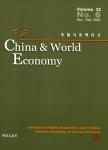Impact of the Global Financial Crisis on China: Empirical Evidence and Policy Implications
Impact of the Global Financial Crisis on China: Empirical Evidence and Policy Implications作者机构:Head of China Economic Research Australia and New Zealand Banking Group Hong Kong
出 版 物:《China & World Economy》 (中国与世界经济(英文版))
年 卷 期:2009年第17卷第6期
页 面:1-23页
核心收录:
学科分类:12[管理学] 02[经济学] 0202[经济学-应用经济学] 1201[管理学-管理科学与工程(可授管理学、工学学位)] 0201[经济学-理论经济学] 020204[经济学-金融学(含∶保险学)] 020105[经济学-世界经济]
主 题:China global financial crisis structural vector autoregression analysis
摘 要:This paper applies a structural vector autoregression analysis to quantify the impact of the global financial crisis on China. It is found that the impact is indeed sizeable: a 1-percent decline in economic growth in the USA, the EU and Japan is likely to lead to a0. 73-percent decline in growth in China. The article discusses whether the current measures of fiscal stimulus are adequate to offset the sharp decline in external demand Although there is little doubt that the massive fiscal stimulus will largely offset the significant shortfalls in external demand, the current growth pattern in China will be increasingly unsustainable in the long term. China "s reform cycles suggest that external shocks are often opportunities for structural reforms. Therefore, the crisis could also be a catulyst for rebalancing China 's economic structure so as to return the economy to a sustainable path.



